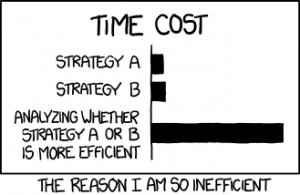 As a teacher, it’s important to get the balance right between instruction and practice. If I only explain how grammar or pronunciation work, but never let the students practice, the instruction is of little use. While all practice and no instruction works much better than all instruction and no practice, some instruction is definitely helpful.
As a teacher, it’s important to get the balance right between instruction and practice. If I only explain how grammar or pronunciation work, but never let the students practice, the instruction is of little use. While all practice and no instruction works much better than all instruction and no practice, some instruction is definitely helpful.
I discussed this particular problem in another article (Learn Chinese implicitly through exposure with a seasoning of explicit instruction), but today I want to apply the same thinking to the learning process itself. The question is simple:
How useful is it to read about how to learn?
Or, more specifically, Will reading Hacking Chinese help you learn Mandarin? The answer to the question about explicit instruction given in the article linked to above was that a vast majority of the time should be spent engaging with the language, not reading about how it works.
The same is true for learning how to learn. While changing the way you learn can increase the rate of learning, most improvements will bring relatively small benefits.
The time frame determines what is sensible to do
Let’s take a cycle race as an example. We have two cyclists with very different approaches but with otherwise identical stamina and technique at the start of the race. The first cyclist sets out immediately at a pace of 25 km/h. The other spends a few hours buying a better bike, watches a few videos about proper cycling technique and so on, and because of this, is able to pedal away at a higher speed, let’s say 30 km/h.
For short distances, it should be obvious that the cyclist who just went for it will win. There are many examples in language learning where this is true. For example, cramming is a valid method if you have a test next week. It works a lot better than spaced repetition, which is what I normally advocate. If it takes the second cyclist four hours to upgrade the speed by 5 km/h, the first cyclist has a head start of 100 km, which will take twenty hours to catch up with.
However, the reason I advocate spaced repetition over cramming, or meaningful learning over rote learning, is of course that we’re not learning Chinese just for the text next week. The race is much longer than 24 hours, in other words.
Language proficiency needs to be maintained and active
This is indeed a major difference between studying languages and other subjects. In many other fields, you can divide what you’re learning into smaller compartments that can be dealt with separately. Naturally, it’s seldom the case that you can then just forget about that compartment, but few subjects rely on you keeping most of the things you’ve ever learnt active all the time.
Unless we’re talking about very advanced or special-purpose language (classical Chinese, technical jargon and so on), you can’t just forget about large chunks of the language and hope they never come up. Forgetting some of the words you’ve learnt might have no impact on your ability to communicate, but the problem is that it’s impossible to predict in advance which words you will need. Since the goal is to learn Chinese rather than pass the exam next week, spaced repetition wins.
(If your goal is actually to pass a test, I’ve written a separate article about that, but I generally assume that students primary goal is to learn the language. In the best of worlds, these would be the same, but that’s seldom entirely true.)
The long haul
This was a rather long detour in our cycling race, but the cyclists are still pedalling. So, we know that over short distances, any method will work better than any other method that doesn’t involve a lot of pedalling right from the start.
Buying a bike that goes 10 % faster or learning at technique to reduce energy consumption by 10 % are not valid strategies for winning a 10 km race if the time to buy the bike and learn the method is included in the race. A 100 km race won’t be enough either. Far worse, time spent thinking about which bike to buy and which method to use don’t help you at all and is wasted. This can be a serious problem.
However, learning Chinese takes much longer than biking 100 km, and at some point, investing in the way you learn starts to make sense. This doesn’t mean that you should wait to a certain point before you start caring about how you learn, it just means that if you’re in it for the long haul, you should care about how you learn, not just charge ahead.
Size matters
If the race is long enough, even small improvements in your learning method are important. However, all improvements shouldn’t be treated equally since they have different impact on how much you learn. For example, spaced repetition is several times more efficient than massed repetition in the long term, so we’re not talking about a mere 10% increase here. Since spaced repetition works for most things, not just vocabulary, it’s likely to have a large impact on how much you learn.
A substitute or a complement to learning?
I think that Hacking Chinese can provide a lot of value in this regard, which is of course the main reason the website exists. If you include time not only to learn a better method, but also to explore, research and develop the method yourself, the race needs to be a lot longer for the investment to pay off. My hope is that my articles can help you improve your method without spending too much time on it.
Before I move on to other potential benefits of reading about how to learn, I’d like to repeat what I said above. Reading Hacking Chinese, or anything else about learning Chinese, will not improve your Chinese directly. It will only do so indirectly, and that will only happen if you also spend a lot more time on actually learning the language.
Scott Young recently wrote a very interesting article about whether reading about self-improvement is a substitute for or a complement to actual self-improvement. The purpose of Hacking Chinese is of course to be a complement to your learning, but if you find yourself spending too much time here or on similar pages, you should perhaps remind yourself why you’re here.
More than just information
This leads us to the final part of this article. The explicit goal of Hacking Chinese is of course to help you improve the way you learn. The current tag line is A better way of learning Mandarin after all.
However, my hope is that this is not the only thing you will take away after reading an article. I also want you to feel inspired and motivated to learn more. I’ve received much positive feedback from readers over the years, and much of it is not about the actual method, but the positive attitude, motivational boosts and generally being inspired to learn. At least in my own experience, this kind of positive energy is easily translatable into studying more.
Conclusion
I would like students and teachers to read Hacking Chinese for information and inspiration, as a complement to learning or teaching Chinese, not as a substitute. I have a friend who reads most of my articles even though he doesn’t study any languages. He says he enjoys reading them, even if they have little practical value for him. I’m flattered that he thinks so, but if you’re learning Chinese, keep in mind that reading my articles doesn’t teach you the language.
My advice is to read about how to learn, as well as culture, history, politics and so on, when you want to take a break from studying. These activities shouldn’t take precedence over actually engaging with the language you’re learning! Reading Hacking Chinese will not in and of it self teach you Mandarin. This was never the goal.
This article was inspired by a post on Chinese Forums, discussing the value of blogs such as Hacking Chinese. There will be a follow-up article discussing knowledge about learning Chinese, where it comes from, for whom it’s valid and the role of scientific research. The current article also assumes that the advice I have to offer is actually sound, a question we will return to in the next article.
In the meantime, what do you think? After all, it’s only of secondary importance if I think Hacking Chinese is useful or not, the goal is that you find it useful!
Further reading
Branwen, G. (2009, 2017). Spaced-repetition Efficient memorization using the spacing effect: literature review of widespread applicability, tips on use & what it’s good for. URL: https://www.gwern.net/Spaced-repetition
Vacha, E. F., & McBride, M. J. (1993). Cramming: A barrier to student success, a way to beat the system or an effective learning strategy? College Student Journal.
Young, S. (2017). Is Reading Blogs Like This One Keeping You From Improving Your Life? URL: https://www.scotthyoung.com/blog/2017/11/07/substitute-or-complement/

Tips and tricks for how to learn Chinese directly in your inbox
I've been learning and teaching Chinese for more than a decade. My goal is to help you find a way of learning that works for you. Sign up to my newsletter for a 7-day crash course in how to learn, as well as weekly ideas for how to improve your learning!
